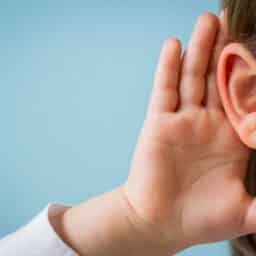What is Third Mobile Window Syndrome?

Third mobile window syndrome (TMWS) is a rare condition characterized by abnormal openings in the bony labyrinth of the inner ear. These abnormal openings may cause a disruption in the fluid dynamics within the ear, leading to auditory and vestibular symptoms, including feelings of vertigo, ear pressure, trouble hearing, unusual sensitivity to noise (hyperacusis) or…
How Can Your Support Make a Difference in Your Loved One’s Tinnitus?

Support from our loved ones can make a significant difference in how effectively we cope during times of stress. Living with tinnitus is one stressor where leaning on your friends and family is essential. Let’s take a closer look at tinnitus and how you can help your friends and family experiencing it feel supported and…
What to Know About Fluctuating Hearing Loss

Fluctuating hearing loss is a form of hearing loss that changes over time and can impact a child’s development, particularly speech and language skills. It can be caused by conductive or sensorineural issues and can worsen over time. It’s important for parents and educators to understand the signs to help aid a child. Fluctuating hearing…
Why Do Hearing Loss & Tinnitus Occur During Pregnancy?

Pregnancy is often an exciting time for expectant parents; however, the side effects can be exhausting. Not only can you feel fatigued, nauseous and swollen, but you may also experience audiological symptoms like hearing loss and tinnitus. Tinnitus, in particular, affects about one in three pregnant women, compared to one in 10 women who aren’t…
Can Anxiety Cause Tinnitus?

When two or more health conditions occur together, they are said to be comorbidities. A common comorbidity of tinnitus is anxiety, and together they can create a cycle where one condition exacerbates the other. Below we review the connection between these two conditions. Anxiety When you think of anxiety, you probably think of generalized anxiety…
How to Cope When You Have Hearing Loss and Tinnitus

Hearing loss and tinnitus can be difficult and disorienting conditions to deal with on their own. If you have both, it can make it difficult to engage in activities you enjoy and significantly diminish your quality of life. What is Tinnitus? Tinnitus is a common condition that affects an estimated 10-15% of the US population….
Strategies for Coping with Brain Fog

Meniere’s disease causes number of symptoms, from vertigo to hearing loss. One of the lesser discussed conditions that accompanies this disorder of the inner ear is brain fog. Continue reading to learn more about what this impairment is and how you help treat your symptoms. What Is Meniere’s Disease? Meniere’s disease is an ear condition…
How Tinnitus Affects Musicians

Tinnitus is a ringing, roaring, whistling, hissing, humming or buzzing sound with no external sound source. Though tinnitus is common – affecting approximately 10-15% of the general population – one demographic is at even greater risk: musicians. By various estimates, 30-50% of musicians experience tinnitus. What Causes Tinnitus? Within the ears are tiny hair cells…
Managing Tinnitus During a Pandemic

One of the biggest triggers for tinnitus is stress. This year, between the pandemic, the economy and political uncertainty, it’s safe to say we’re all experiencing an unusual amount of stress. If you’re experiencing worsening or a resurgence of tinnitus symptoms, know that you’re not alone and that there are actions you can take to…
Manage Your Tinnitus During Stressful Times

Stress is a well-known trigger for tinnitus. And many would argue there hasn’t been a time in recent history more stressful than the present. This is why people suffering from tinnitus should take extra care to manage their stress levels. When your tinnitus is severe, your nervous system becomes stuck in a state of constant…

